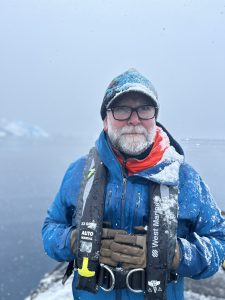
Did you know the biggest animals on Earth eat some for the smallest shrimp and fish? In this fun and fascinating session, we’ll dive into the world of rorqual whales— gulp-feeding giants like the speedy blue whale, the energetic humpback, and the ‘small’ but mighty minke whale – and how their size relates to what they eat, how they move, and ultimately why they can thrive in the ocean eating such tiny organisms. We’ll look at how we can measure whales remotely using drones, and how whale size affects their mobility and how much they need to eat. We’ll share cool stories and videos from real whale research. From massive gulps of krill to sneaky dives under the ice, this is your chance to meet the whales and the science helping us understand them better than ever before!
About our speaker
Dr. David W. Johnston is a Professor of the Practice of Marine Conservation & Ecology at Duke University and the Associate Dean of Teaching Innovation at the Nicholas School of the Environment. Johnston chairs the Duke Environmental Leadership Master’s Program and is the Director of the Marine Robotics and Remote Sensing (MaRRS) Lab at Duke University. Johnston holds a PhD from Duke University and received post-doctoral training at the Monterey Bay Aquarium Research Institute in California. His professional experience ranges from leading research programs for NOAA to working as an ecologist within the NGO sector. Johnston’s research program currently focuses on advancing robotic applications, platforms and sensors for marine science, education, and conservation missions.
Recommended for ages 11–17. YouTube livestream also available.
Teen Science Cafés bring teens together in an informal setting to learn about science and technology on the first Friday of each month during the school year. Each café includes a scientist presentation, an interactive activity relating to the discussion, a Q&A session, and time to socialize with other teens who enjoy science.


